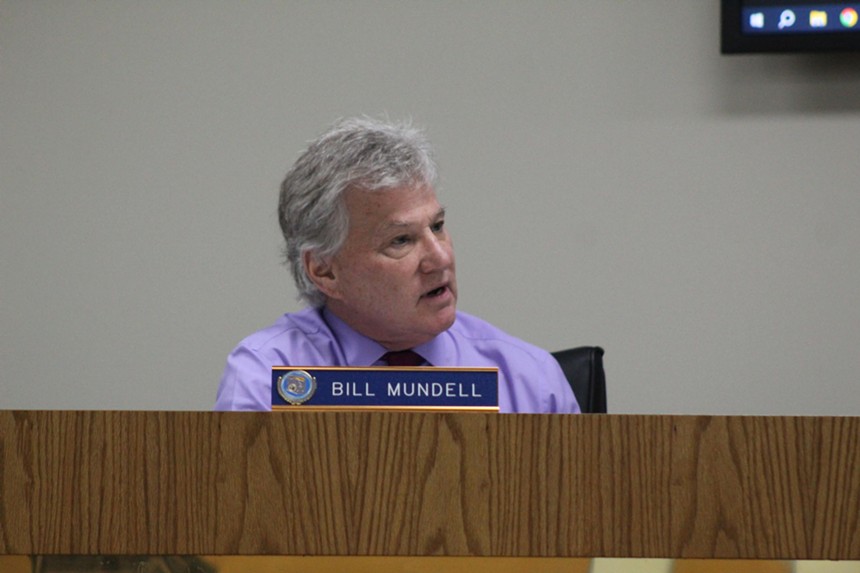Joshua Auer, a former Nevada State Police Department officer applying to join the Casa Grande Police Department, admitted to taking substances like cocaine, LSD, ecstasy and methamphetamines between 2000 and 2002. Even though Auer took those drugs more than two decades ago, that drug use is disqualifying under Arizona law.
However, Casa Grande police Chief Mark McCrory showed up to sway the Arizona Peace Officer Standards and Training Board to allow Auer to join his force.
“I’ve been in this business 42 years roughly, and I don’t take lightly to the request I’m making in front of you today,” McCrory said. “I would not be here if I did not strongly believe that Josh would be a valuable addition to our agency.”
AZPOST licenses all law enforcement officers in the state and is one of the few agencies in Arizona with the power to discipline police. The 12-member board includes Arizona Attorney General Kris Mayes, two rural sheriffs, Phoenix City Councilmember Kevin Robinson and Ryan Thornell, director of the Arizona Department of Corrections, Rehabilitation and Reentry. Two newly appointed police chief members, Araceli Jaurez of Somerton and Ken Cost of Mesa, were announced at the Sept. 18 meeting.
With only two votes against it, the board approved Auer’s waiver. But that decision also opened a debate among the board’s members about its rules and the exceptions it grants for past drug use. Auer’s petition was the third this year granted for past use of illicit drugs, one of which was for a single use.
Arizona law requires all prospective peace officers to undergo a polygraph test, and anyone who admits to having used illegal substances other than marijuana five or fewer times must wait seven years to be eligible to be a licensed peace officer. Anyone who has used such substances more than five times cannot be a cop — technically.
The state’s standards for weed use are less stringent, prohibited only between six months and two years before a candidate’s appointment to a law enforcement agency. AZPOST has approved 29 waivers for past use of marijuana and at least four for officer candidates who admitted to having sold weed. In the Wednesday meeting alone, the board approved eight applicants in a single vote without any discussion.
Marijuana, of course, is not only legal in Arizona but mainstream. It can be bought in stores just like alcohol, yet weed use is against AZPOST’s rules while alcohol is not. Considering that AZ POST has punished at least four officers for driving drunk this year and opened investigations into more, there seems to be a double standard.
At the Sept. 18 meeting, Coconino County Sheriff’s Office jail commander Matthew Figueroa said the board should reconsider its standards for past drug use and not just for marijuana. He said the Coconino County jail system is interested in changing its requirements for correctional officers, but it can’t until AZPOST does, too.
“At some point, we’re going to need to sit down and talk about the dangerous drugs standards that have been set,” Figueroa said, “and look at the timeline and look at the number of usage and see if we need to make any adjustments.”
AZPOST Executive Director Matt Giordano said the board is not ready to change its policies, though he encouraged discussion of doing so. He said there isn’t good data about the policies of other states. Giordano also said he went back through old board meeting minutes but couldn’t find a rationale for Arizona’s policy.
“Five uses, seven years,” Giordano said, “where that came from, I have no idea.”

Bill Mundell, chief deputy of policy and administration for Arizona Attorney General Kris Mayes, was one of several members of the Arizona Peace Officer Standards and Training Board to grant a waiver to prospective Casa Grande police officer Joshua Auer, who admitted to past drug use.
TJ L'Heureux
‘A significant amount of time’
There are reasons why someone with past drug use shouldn’t be disqualified from being in law enforcement. Someone with Auer’s background might be more likely to empathize with those using and addicted to drugs, who make up a not-insignificant number of those who come into contact with police.However, the board did not discuss those broader issues at its meeting, focusing more on how long it had been since Auer’s admitted drug use.
“If I told you some things I might have thought was fun when I was 16 and 18,” McCrory told the board, “I probably wouldn’t be here today.”
“Chief, I want to remind you, you have the right to remain silent,” joked Bill Mundell, the chief deputy of policy and administration for the attorney general’s office.
Auer also spoke about his own journey. He learned he would become a father at 18 years old, got straight and eventually became a cop in Nevada for 10 years. Now 40, Auer has two kids who are enrolled in college.
He said he moved to Arizona to be with his fiancee, with whom he has been in a long-distance relationship for five years. Nevada’s standards for peace officers were different, he added, so he did not need a waiver for his drug use to become a state trooper.
“My past experiences gave me a deeper understanding of the devastation that drug use can cause,” Auer said. “Over the past decade, I’ve worked relentlessly to remove harmful substances, like methamphetamine, fentanyl and heroin from the streets.”
Mundell and other board members felt Auer’s testimony and his recommendations from past employers were enough to outweigh them. “This was two decades ago that this young man engaged in that behavior,” Giordano said. “That is a significant amount of time.”
But Lt. Col. Ken Hunter of the Arizona Department of Public Safety was one of two to vote against Auer, although he said he was torn over the decision.
Rules are rules, after all, even if the board that enforces them can’t recall why they were established in the first place. But given that AZPOST keeps ignoring them, it’s probably time to question their practicality.













